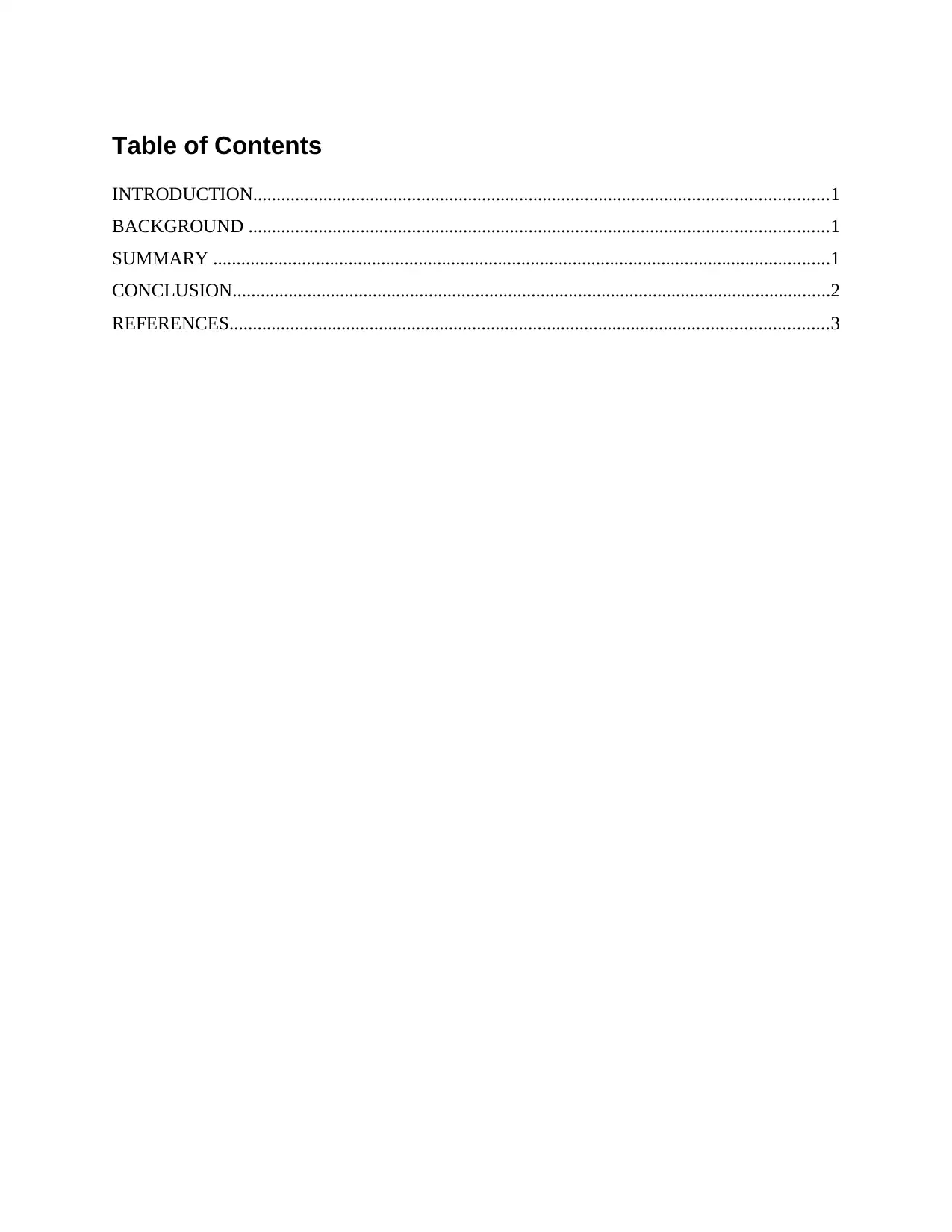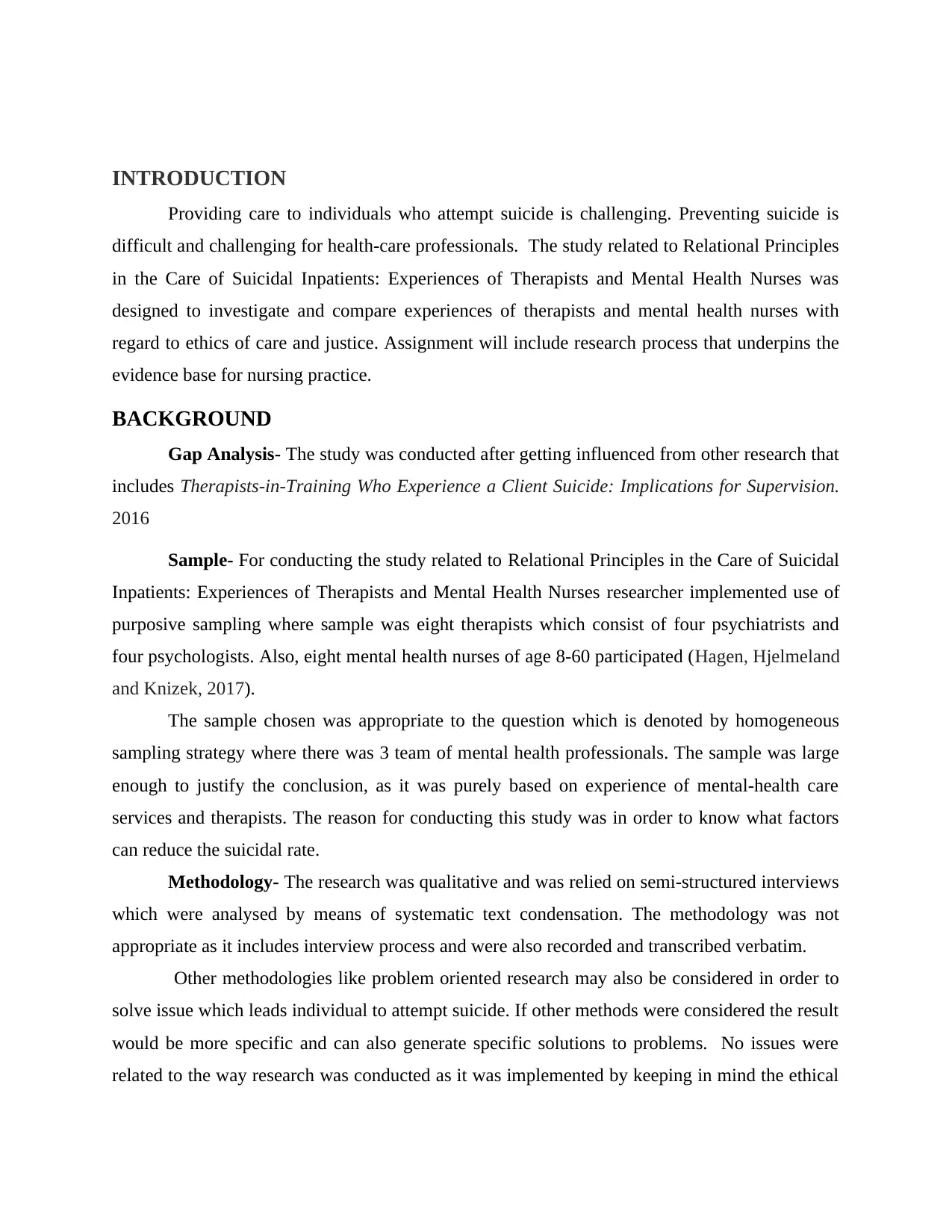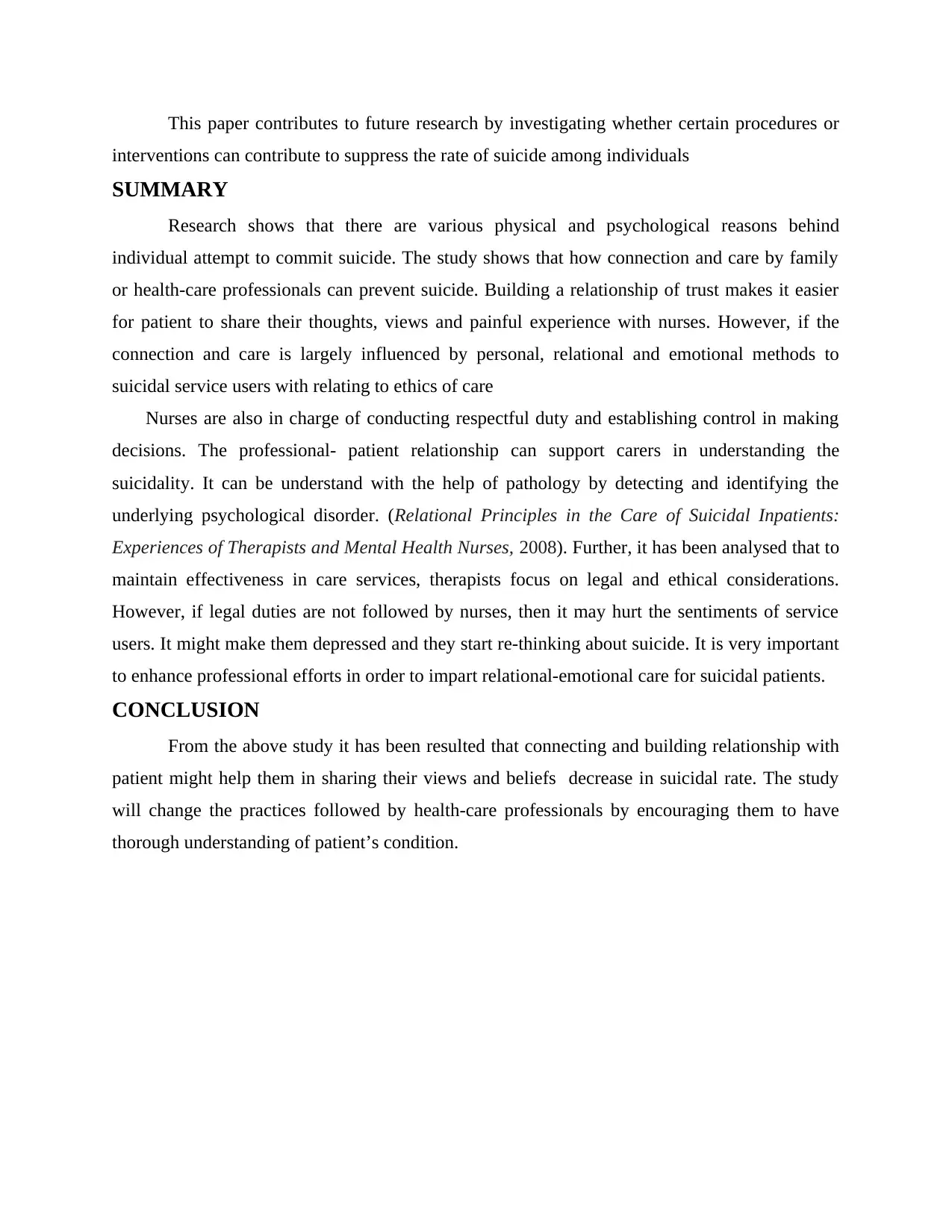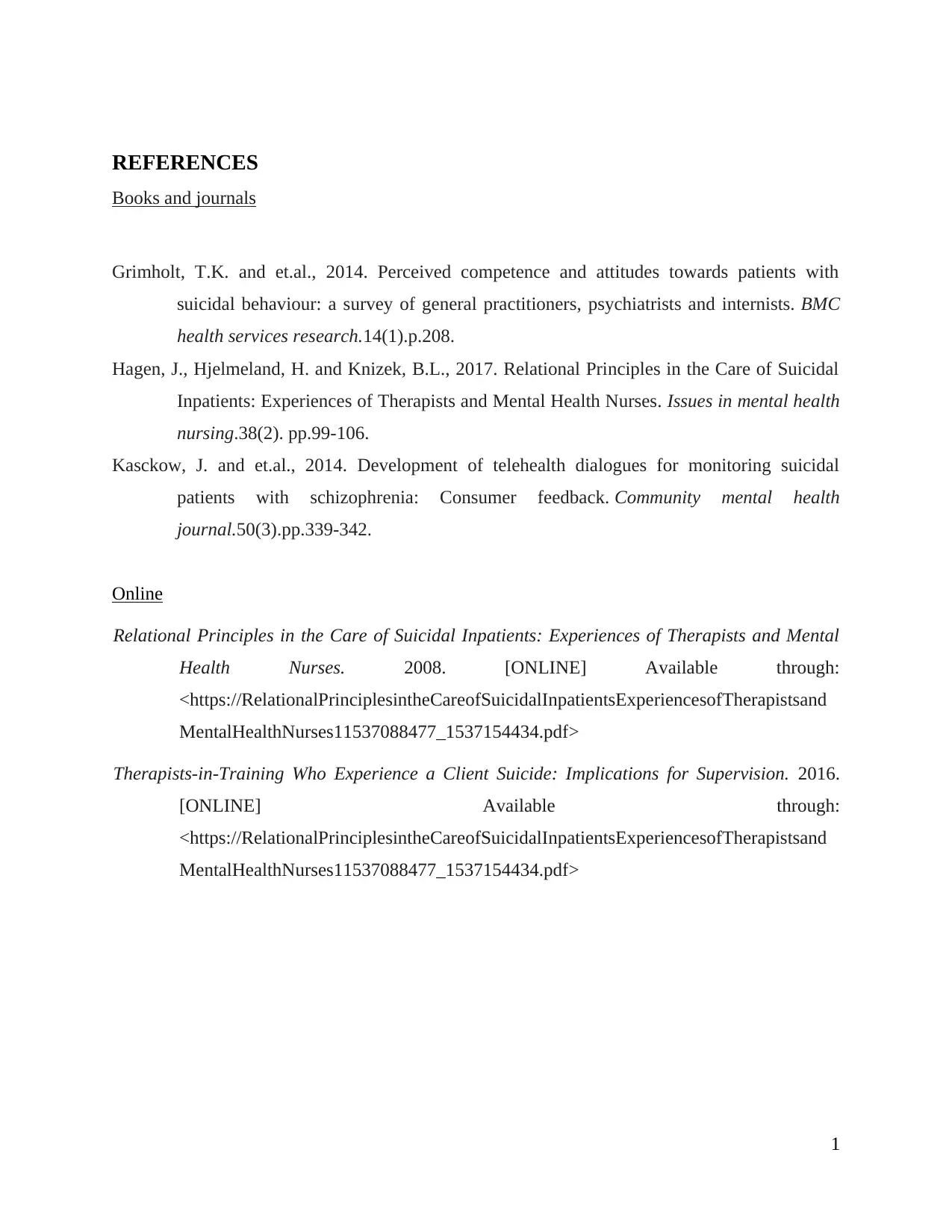Analysis of Relational Principles in Suicide Care: A Nursing Report
VerifiedAdded on 2021/01/02
|8
|846
|374
Report
AI Summary
This report delves into the crucial topic of relational principles in the care of suicidal inpatients, drawing upon research that compares the experiences of therapists and mental health nurses. The study explores the application of ethical considerations and principles of justice within the context of suicide prevention, emphasizing the significance of building trust and fostering open communication between healthcare professionals and patients. The report examines the methodology, including the use of semi-structured interviews, and assesses its appropriateness, suggesting potential alternative methodologies. It highlights the importance of relational-emotional care, the impact of professional-patient relationships, and the role of ethical duties in preventing patient distress. The findings underscore the potential for enhancing professional practices and improving patient outcomes by encouraging a thorough understanding of each patient's unique condition and needs. The report concludes by emphasizing the need for healthcare professionals to adopt relational-emotional care strategies to reduce suicidal rates.

NURSING
Paraphrase This Document
Need a fresh take? Get an instant paraphrase of this document with our AI Paraphraser

Table of Contents
INTRODUCTION...........................................................................................................................1
BACKGROUND ............................................................................................................................1
SUMMARY ....................................................................................................................................1
CONCLUSION................................................................................................................................2
REFERENCES................................................................................................................................3
INTRODUCTION...........................................................................................................................1
BACKGROUND ............................................................................................................................1
SUMMARY ....................................................................................................................................1
CONCLUSION................................................................................................................................2
REFERENCES................................................................................................................................3

INTRODUCTION
Providing care to individuals who attempt suicide is challenging. Preventing suicide is
difficult and challenging for health-care professionals. The study related to Relational Principles
in the Care of Suicidal Inpatients: Experiences of Therapists and Mental Health Nurses was
designed to investigate and compare experiences of therapists and mental health nurses with
regard to ethics of care and justice. Assignment will include research process that underpins the
evidence base for nursing practice.
BACKGROUND
Gap Analysis- The study was conducted after getting influenced from other research that
includes Therapists-in-Training Who Experience a Client Suicide: Implications for Supervision.
2016
Sample- For conducting the study related to Relational Principles in the Care of Suicidal
Inpatients: Experiences of Therapists and Mental Health Nurses researcher implemented use of
purposive sampling where sample was eight therapists which consist of four psychiatrists and
four psychologists. Also, eight mental health nurses of age 8-60 participated (Hagen, Hjelmeland
and Knizek, 2017).
The sample chosen was appropriate to the question which is denoted by homogeneous
sampling strategy where there was 3 team of mental health professionals. The sample was large
enough to justify the conclusion, as it was purely based on experience of mental-health care
services and therapists. The reason for conducting this study was in order to know what factors
can reduce the suicidal rate.
Methodology- The research was qualitative and was relied on semi-structured interviews
which were analysed by means of systematic text condensation. The methodology was not
appropriate as it includes interview process and were also recorded and transcribed verbatim.
Other methodologies like problem oriented research may also be considered in order to
solve issue which leads individual to attempt suicide. If other methods were considered the result
would be more specific and can also generate specific solutions to problems. No issues were
related to the way research was conducted as it was implemented by keeping in mind the ethical
Providing care to individuals who attempt suicide is challenging. Preventing suicide is
difficult and challenging for health-care professionals. The study related to Relational Principles
in the Care of Suicidal Inpatients: Experiences of Therapists and Mental Health Nurses was
designed to investigate and compare experiences of therapists and mental health nurses with
regard to ethics of care and justice. Assignment will include research process that underpins the
evidence base for nursing practice.
BACKGROUND
Gap Analysis- The study was conducted after getting influenced from other research that
includes Therapists-in-Training Who Experience a Client Suicide: Implications for Supervision.
2016
Sample- For conducting the study related to Relational Principles in the Care of Suicidal
Inpatients: Experiences of Therapists and Mental Health Nurses researcher implemented use of
purposive sampling where sample was eight therapists which consist of four psychiatrists and
four psychologists. Also, eight mental health nurses of age 8-60 participated (Hagen, Hjelmeland
and Knizek, 2017).
The sample chosen was appropriate to the question which is denoted by homogeneous
sampling strategy where there was 3 team of mental health professionals. The sample was large
enough to justify the conclusion, as it was purely based on experience of mental-health care
services and therapists. The reason for conducting this study was in order to know what factors
can reduce the suicidal rate.
Methodology- The research was qualitative and was relied on semi-structured interviews
which were analysed by means of systematic text condensation. The methodology was not
appropriate as it includes interview process and were also recorded and transcribed verbatim.
Other methodologies like problem oriented research may also be considered in order to
solve issue which leads individual to attempt suicide. If other methods were considered the result
would be more specific and can also generate specific solutions to problems. No issues were
related to the way research was conducted as it was implemented by keeping in mind the ethical
⊘ This is a preview!⊘
Do you want full access?
Subscribe today to unlock all pages.

Trusted by 1+ million students worldwide

considerations (Grimholt and et.al., 2014).Also, regional committee for medical and health
research ethics has approved the study.
research ethics has approved the study.
Paraphrase This Document
Need a fresh take? Get an instant paraphrase of this document with our AI Paraphraser

This paper contributes to future research by investigating whether certain procedures or
interventions can contribute to suppress the rate of suicide among individuals
SUMMARY
Research shows that there are various physical and psychological reasons behind
individual attempt to commit suicide. The study shows that how connection and care by family
or health-care professionals can prevent suicide. Building a relationship of trust makes it easier
for patient to share their thoughts, views and painful experience with nurses. However, if the
connection and care is largely influenced by personal, relational and emotional methods to
suicidal service users with relating to ethics of care
Nurses are also in charge of conducting respectful duty and establishing control in making
decisions. The professional- patient relationship can support carers in understanding the
suicidality. It can be understand with the help of pathology by detecting and identifying the
underlying psychological disorder. (Relational Principles in the Care of Suicidal Inpatients:
Experiences of Therapists and Mental Health Nurses, 2008). Further, it has been analysed that to
maintain effectiveness in care services, therapists focus on legal and ethical considerations.
However, if legal duties are not followed by nurses, then it may hurt the sentiments of service
users. It might make them depressed and they start re-thinking about suicide. It is very important
to enhance professional efforts in order to impart relational-emotional care for suicidal patients.
CONCLUSION
From the above study it has been resulted that connecting and building relationship with
patient might help them in sharing their views and beliefs decrease in suicidal rate. The study
will change the practices followed by health-care professionals by encouraging them to have
thorough understanding of patient’s condition.
interventions can contribute to suppress the rate of suicide among individuals
SUMMARY
Research shows that there are various physical and psychological reasons behind
individual attempt to commit suicide. The study shows that how connection and care by family
or health-care professionals can prevent suicide. Building a relationship of trust makes it easier
for patient to share their thoughts, views and painful experience with nurses. However, if the
connection and care is largely influenced by personal, relational and emotional methods to
suicidal service users with relating to ethics of care
Nurses are also in charge of conducting respectful duty and establishing control in making
decisions. The professional- patient relationship can support carers in understanding the
suicidality. It can be understand with the help of pathology by detecting and identifying the
underlying psychological disorder. (Relational Principles in the Care of Suicidal Inpatients:
Experiences of Therapists and Mental Health Nurses, 2008). Further, it has been analysed that to
maintain effectiveness in care services, therapists focus on legal and ethical considerations.
However, if legal duties are not followed by nurses, then it may hurt the sentiments of service
users. It might make them depressed and they start re-thinking about suicide. It is very important
to enhance professional efforts in order to impart relational-emotional care for suicidal patients.
CONCLUSION
From the above study it has been resulted that connecting and building relationship with
patient might help them in sharing their views and beliefs decrease in suicidal rate. The study
will change the practices followed by health-care professionals by encouraging them to have
thorough understanding of patient’s condition.

REFERENCES
Books and journals
Grimholt, T.K. and et.al., 2014. Perceived competence and attitudes towards patients with
suicidal behaviour: a survey of general practitioners, psychiatrists and internists. BMC
health services research.14(1).p.208.
Hagen, J., Hjelmeland, H. and Knizek, B.L., 2017. Relational Principles in the Care of Suicidal
Inpatients: Experiences of Therapists and Mental Health Nurses. Issues in mental health
nursing.38(2). pp.99-106.
Kasckow, J. and et.al., 2014. Development of telehealth dialogues for monitoring suicidal
patients with schizophrenia: Consumer feedback. Community mental health
journal.50(3).pp.339-342.
Online
Relational Principles in the Care of Suicidal Inpatients: Experiences of Therapists and Mental
Health Nurses. 2008. [ONLINE] Available through:
<https://RelationalPrinciplesintheCareofSuicidalInpatientsExperiencesofTherapistsand
MentalHealthNurses11537088477_1537154434.pdf>
Therapists-in-Training Who Experience a Client Suicide: Implications for Supervision. 2016.
[ONLINE] Available through:
<https://RelationalPrinciplesintheCareofSuicidalInpatientsExperiencesofTherapistsand
MentalHealthNurses11537088477_1537154434.pdf>
1
Books and journals
Grimholt, T.K. and et.al., 2014. Perceived competence and attitudes towards patients with
suicidal behaviour: a survey of general practitioners, psychiatrists and internists. BMC
health services research.14(1).p.208.
Hagen, J., Hjelmeland, H. and Knizek, B.L., 2017. Relational Principles in the Care of Suicidal
Inpatients: Experiences of Therapists and Mental Health Nurses. Issues in mental health
nursing.38(2). pp.99-106.
Kasckow, J. and et.al., 2014. Development of telehealth dialogues for monitoring suicidal
patients with schizophrenia: Consumer feedback. Community mental health
journal.50(3).pp.339-342.
Online
Relational Principles in the Care of Suicidal Inpatients: Experiences of Therapists and Mental
Health Nurses. 2008. [ONLINE] Available through:
<https://RelationalPrinciplesintheCareofSuicidalInpatientsExperiencesofTherapistsand
MentalHealthNurses11537088477_1537154434.pdf>
Therapists-in-Training Who Experience a Client Suicide: Implications for Supervision. 2016.
[ONLINE] Available through:
<https://RelationalPrinciplesintheCareofSuicidalInpatientsExperiencesofTherapistsand
MentalHealthNurses11537088477_1537154434.pdf>
1
⊘ This is a preview!⊘
Do you want full access?
Subscribe today to unlock all pages.

Trusted by 1+ million students worldwide

2
Paraphrase This Document
Need a fresh take? Get an instant paraphrase of this document with our AI Paraphraser

3
1 out of 8
Related Documents
Your All-in-One AI-Powered Toolkit for Academic Success.
+13062052269
info@desklib.com
Available 24*7 on WhatsApp / Email
![[object Object]](/_next/static/media/star-bottom.7253800d.svg)
Unlock your academic potential
Copyright © 2020–2026 A2Z Services. All Rights Reserved. Developed and managed by ZUCOL.





